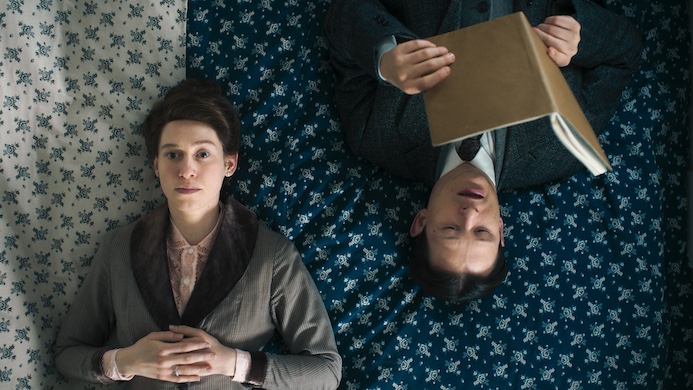In Moving Kafka Beyond the Page, a Television Series Succeeds Where the Likes of Orson Welles Have Struggled
Imagine a David Lynch phantasmagoria leavened with the decorative ambiance of Edouard Vuillard. This is a lush entertainment, lovely to look at and ready to be savored.

Here’s a prediction: Critics will twist themselves into knots while trying to spin the adjective “Kafkaesque” when writing about a six-episode television series soon to be streaming on ChaiFlicks, “Kafka.”
How redolent is this Austrian-made venture of the neurasthenic absurdism typifying the writings by the doomed Czech modernist? Literature and film are two very different mediums: Attempts by Orson Welles and Michael Haneke to adapt Kafka’s vision to the silver screen have proven, if not uninteresting, then decidedly lumpy.
Is Kafka at all capable of being transformed into extra-literary media? Comedy mavens may recall Zero Mostel, as the Broadway huckster Max Bialystock in Mel Brooks’s “The Producers” (1967), rifling through a slush pile of bad plays, picking up a portfolio and reading aloud the following sentence: “As Gregor Samsa awoke one morning from uneasy dreams he found himself transformed in his bed into a gigantic insect.” Bialystock wrinkles his nose, does a slight shake of the head, and comments: “It’s too good.” Thus, into the trash goes “The Metamorphosis.”
“Kafka” is the work of writer Daniel Kehlman — “Measuring the World” (2005) is likely the best known of his novels — and David Schalko, an Austrian filmmaker with no little chutzpah. His didactically titled “M — A City Hunts a Murderer” (2019), dared to make a TV miniseries out of Fritz Lang’s cinematic masterpiece “M” (1931).
Then again, art is nothing without chutzpah, and the cinematic liberties taken by Messrs. Kehlman and Schalko in “Kafka” are nonetheless bolstered by fact. Their guide post was the author of a multi-volume and, by some lights, definitive biography of Kafka, Reiner Stach. Scholars will undoubtedly have something to say about the veracity of the series. A couple of literary lights have already chimed in: Salman Rushdie and Ian McEwan. “Perfectly cast, stunningly acted,” the former writes; the latter describes the series as “simply brilliant.”

The first episode of “Kafka” details the author’s dying wish: that the entirety of his corpus be destroyed. The executor of the Kafka estate, Max Brod, his friend and fellow writer, famously refused to follow the directive. Through some clever and surprisingly effective feints of fiction, Messrs. Kehlman and Schalko give us a rough trajectory of Brod’s betrayal, the most dramatic moment being the safe carriage of Kafka’s personal papers on the last train out of Prague before the Nazi occupation.
Messrs. Kehlman and Schalko, likely working in the presumed spirit of Kafka, have shaped the series in a nonlinear fashion. Each segment centers on a person or entity important to Kafka’s life; these include not only Brod, but his family, three paramours, and his workplace — or, as the title of episode four ominously puts it, “The Bureau.” The aim of Messrs. Kehlman and Schalko was to lessen, if not altogether remove, the haze of myth that invariably attends to a significant artist. Kafka was, they suggest, something other than merely a “Jewish Kabbalistic prophet.” He did, after all, make a go of it in the real world.
The glimpses we get of Kafka’s time as an insurance lawyer in “The Bureau” is that of a productive individual whose idiosyncrasies serve his employers well. Sure, he complains about how the work is taking time away from his writing, but Kafka does have a head — or, as it is said politely nowadays, “special interest” — in the minutiae of the law. The higher-ups are happy with his performance and exhibit no qualms in giving Kafka a raise. Neither do they show restraint in fobbing off their amateur efforts at poetry and literature on the star employee.
A lot of evident care has been invested in “Kafka.” Production design, cinematography, and accompanying music are handsomely contrived and appropriate to both the time-frame of the picture and what can only be called its psychological ambiance. Although Mr. Schalko isn’t beyond postmodernist narrative tics, his focus stays true to the characters and the mise en scene: imagine a David Lynch phantasmagoria leavened with the decorative ambiance of Edouard Vuillard. This is a lush entertainment, lovely to look at and ready to be savored.
The cast is uniformly solid — especially David Kross, who is given a lot of heavy lifting to do as Brod — though some casting decisions are dubious. Having the lovely Verena Altenberger don a mustache and men’s clothing as the novelist Robert Musil strikes a jarring note. Franz knew better than to upset a carefully tendered fiction with anything so crass as ideological fashion. As it is, Mssrs. Kehlman and Schalko do right more often than not by a “Kafka” that is, if not Kafkaesque, then a marked cut above the standard cinematic biography.

